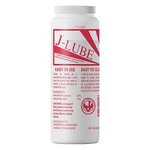I know that KY Jelly is an excellent lube, so we can base on its composition :
Water, Propylene Glycol, Hydroxyethylcellulose, Benzoic Acid, Carbomer, Sodium Hydroxide
source link
I wonder, however, if other water-based lubes are just as "safe".
After some research on the web, I found "Lubido", although it is water based, but it is difficult to know if it's safe :
Aqua, Glycerin, Propylene Glycol, Hydroxyethyl Cellulose, 1,2-Hexanediol, 4'-Hydroxyacetophenone
source link
ChatGPT says this :
Sodium hydroxide : this is an extremely caustic substance, also known as lye. It is a very strong irritant, and even a small amount can cause chemical burns. If a dog ingests or comes into contact with sodium hydroxide, it can cause serious damage to the mouth, esophagus, or stomach
Propylene Glycol: Tolerated at low doses in dogs. May cause hemolytic anemia or neurological disorders if used chronically or in high doses.
1,2-Hexanediol: Little research specifically in dogs; caution is recommended in the absence of specific data.
4'-Hydroxyacetophenone: Very little data available. Theoretical risk: Some phenolic compounds may be hepatotoxic to dogs.
For ChatGPT, even K-Y would be dangerous to use (Sodium hydroxide), however my knowledge does not allow me to validate or not this answer.
@Deagle113 can we have your opinion on these components of this two lube ?
The amount of lye (Sodium Hydroxide) involved is so small as to be meaningless - It's there to adjust the pH of the overall mixture into the "neutral or slightly basic" range. It's also a common ingredient in various injectable drugs, for exactly the same purpose - pH adjustment. Likewise, it's used in some foods, again to alter the pH into the neutral to slightly basic range. If you've ever taken Bufferin brand aspirin, you've eaten it - it's part of the "buffering" system used to help prevent taking lots of aspirin long-term from giving you an ulcer (Aspirin is a double-whammy for ulcers - As an NSAID, it contributes by shutting down production of mucus in the stomach, which increases the possibility of an ulcer forming, and is a fairly potent acid all by itself)
At least until they get it dialed in better, *NEVER* assume ChatGPT knows what it's talking about when it comes to chemistry and/or drugs unless you KNOW that what it says is correct from your own knowledge and/or references you trust.
Propylene Glycol is the "pet-safe" antifreeze - Ethylene Glycol ("regular" antifreeze) is SEVERELY toxic, and in large enough doses, will kill damn near anything that's a mammal. It gets metabolized into formaldehyde, then formic acid (which is the actual "kills you" chemical - it causes acidosis, which shuts down a shitload of bodily functions), and in the process, fucks up the liver badly, and may destroy the kidneys.
Propylene Glycol is in MANY human foods - Particularly cake/bread/cookie-ish things - It acts as a sweetener, and more importantly, keeps the product moist and fresh by holding on to water, and is one of the "generally recognized as safe" additives. It's also fairly slippery. To be a significant problem, the dog would have to ingest pretty large amounts, and the most likely "Bad effect" would be a case of the drizzling shits for a day or three.
The last ingredient of your "Lubido" is an antioxidant.
The next-to-last is a close chemical cousin to Propylene Glycol, and does many of the same things, though in humans, it's usually used in skin creams and cosmetics, rather than as a food additive.
Aqua is just the preferred (since it sounds more impressive) way to say "water" in the cosmetics and skin-cream industry.
Glycerin is, in and of itself, pretty slippery, and unless you're eating it in job-lots, the worst it's likely to do to any critter is give it a transient case of the runs.
The hydroxyethylcellulose, in combination with water, and to a slightly lesser degree, glycerine, is the "Make this shit slippery as hell" main ingredient in nearly all sex lubes. It's safe enough, but again, ingesting it in large quantities would likely give you a case of the runs for a day or two.
Benzoic acid is another antioxidant/preservative/mild antiseptic, and you'll find it listed in the ingredients of damn near every loaf of store-bought bread, and MANY other food items, prescription (and quite a few non-prescription) drugs, skin creams, cosmetics, shampoos - ALL KINDS of stuff. Again, unless you're chugging it like kool-aid, the worst it's likely to do is give you the shits.
Carbomer is mostly used as a thickening agent, sorta like adding flour or corn starch to pan-drippings to make gravy instead of "watery grease", acts as an emulsifier (makes oils and water mix more easily), and if you put enough of it into a mixture, will make it "gel", rather than staying "runny". I understand that it's in SOME foods, but it's more often in cosmetics and skin-creams.


